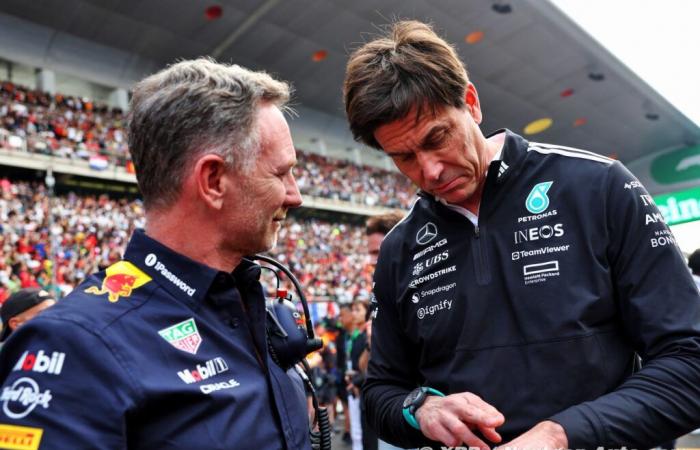He never ceases to sound the alarm! Christian Horner, the pattern of Milton Keynes, does not like the next engine regulations at all. He claims to be concerned about the ‘lift-and-coast’ which would become inevitable, according to him, for the F1 in the middle of straight lines on the fast circuits like Monza.
But the rest of the engineers do not seem ready to adapt the regulations, as requests Christian Horner. We even suspect that the boss of Red Bull, worried about the delay taken by Red Bull Powertrains and Ford, tries to limit the breakage …
“The regulations are set for next year, and this is what everyone has designed and developed their engines” First recognized Christian Horner, at a press conference in Miami.
“The biggest concern is not new-this is the one that was reported two years ago by all the engine manufacturers: the quantity of energy recovery that there is, and inevitably chassis designers will inevitably surpass the expectations of the regulations, and a consequence of this will be the ‘lift-and-coast’ that there will be in a grand prize. »»
“It should also be remembered that under the 2026 regulations, the car is actually constantly in DRS mode. As soon as you enter the straight line, the fin opens. So there will be no DRS surpassing mechanism. »»
“The FIA raised this subject which was examined again recently by the engine manufacturers. If it is really in the interest of sport and the race, not to have this foot and free wheel, then I think it is something that deserves to be examined. »»
“This does not change the specifications or the power of the engine. It’s just the quantity of battery deployment perhaps during certain great prices. »»
Toto Wolff, present alongside Christian Horner at a conference, swept away the criticisms of his counterpart.
For him, Christian Horner’s maneuver is simple: he tries to protect the interests of his team, which is understandable!
“Obviously, the closer we get closer to the new regulations, the more people act – all of us – in the interest of their own team, it is their duty. »»
“We don’t know how it’s going to be next year. Are we going to see energy recovery disasters in Baku or Monza? I don’t know. We hope not. »»
Toto Wolff does not propose to rewrite the engine regulations now, but to wait and see how the first Grands Prix is going. He concedes that motor skills could exceed expectations, and perhaps he has more information on the expected level of performance of Mercedes F1 …
“What we have pointed out is that, rather than acting now on the basis of hypotheses-as we have been excellent in previous years and then exceeded or underestimated-as Christian said, you don’t need to throw the hardware and offer something new-it’s in the software and the bandwidth of what you can do. »»
“We will see the final product next year during the tests. As a engine manufacturer, we want it to be a big show. We want to win, but we are also aware that in sport, there must be variability and unpredictability. »»
-“We appreciated years from 2014, but over an extended period, it is certainly not the best for sport. »»
“I try to be very balanced between what is good for Mercedes, which I have to do, and what is the right solution for the future. We must avoid these fluctuations. »»
Toto Wolff finally makes a shy opening, admitting to be open to a change: but only if necessary and after the start of the year.
“The FIA proposed this engine; No one loved him. The 50% electric at the time was the direction taken by road cars and that was a reason to attract manufacturers like Audi and Porsche. So we did it. »»
“It is difficult to change the rules of the game, especially for newcomers. Honda has re -engaged, and Audi is committed, and including us, they are not eager to change these rules of the game at this stage. But we must be open in mind if necessary. »»
The cost of sustainable fuels in question
The other great revolution next year will also be at the fuel level, which will have to be 100 % durable. Inevitably, this has had consequences on their cost that should increase.
“It was raised by one of the engine manufacturers” confirme Christian Horner.
“Personally, for us, this is not a significant problem. »»
“There are a lot of development costs in these new sustainable fuels that are introduced. Perhaps a certain range should be introduced in the future. »»
“But fuel is potentially one of the largest performance differentiaries. The oil companies seem very committed to this. »»
Toto Wolff admits that the cost of fuels is increasing, but there again, no question of going back to the subject.
“From my point of view, what makes it so expensive, is that the whole supply chain and the energy contribution must be green. To achieve all of this, you need a certain specification of ingredients which is very expensive – and it happens much more expensive than anyone who thought it. »»
“So we have to examine if there is something we can adjust to lower the price in the liters. We want to be open -minded. »»
“Petronas was an excellent partner for us. They are fully technically engaged in the project, and with them, we assess if there is regulation which can be modified to make it more sustainable financially. »»






